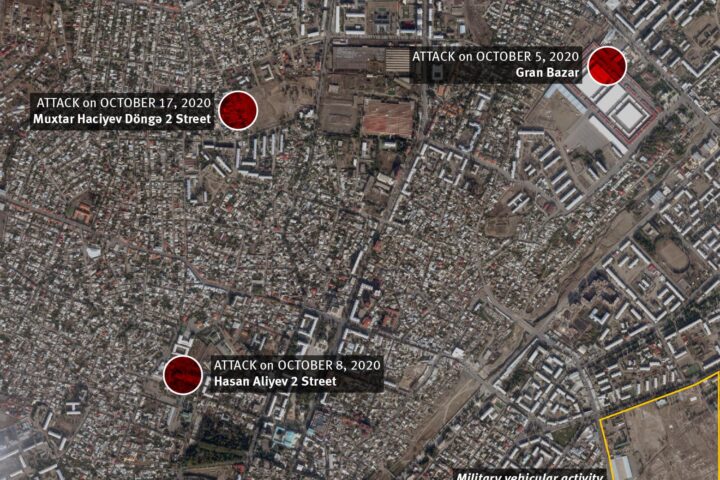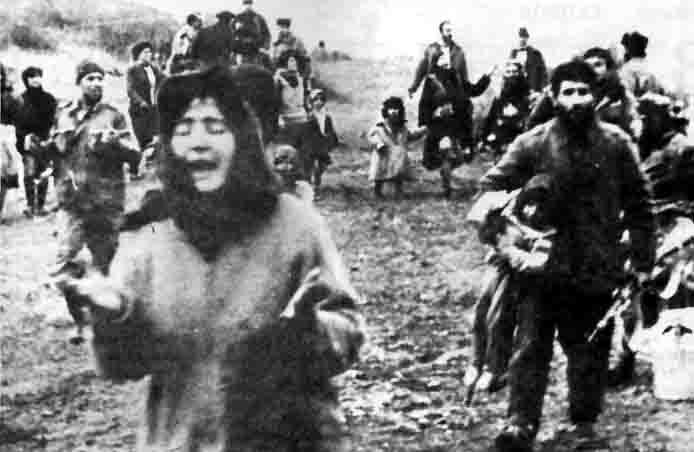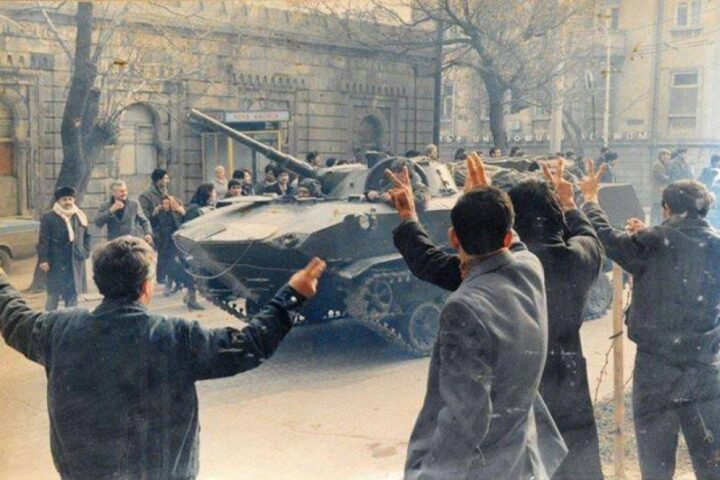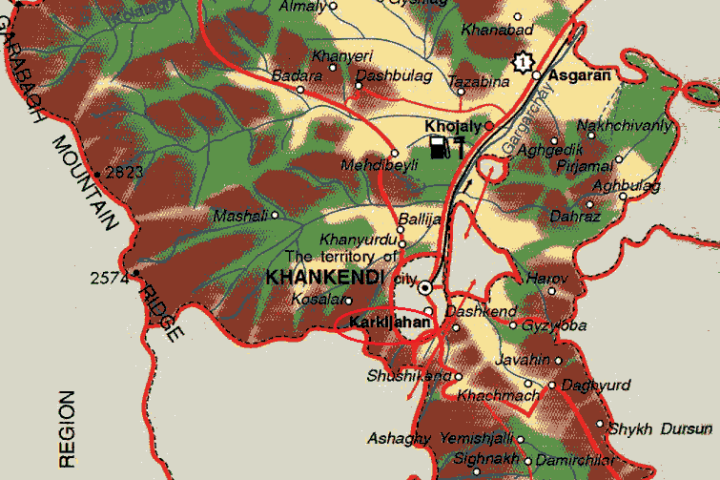THE ANALYSIS OF POSSIBLE VARIANTS OF POLITICAL SOLUTION TO THE KARABAKH CONFLICT
Since 1988, i.e. the beginning of the Karabakh events, the officially interested parties (states, international organizations) as well as individuals: statesmen, scholars and many public and political organizations, have advanced different proposals for the resolution of the Karabakh conflict. In the given chapter we attempt to offer as full an account as possible of these proposals according to the following scheme:
1. The international-legal aspects of the problem.
2. The possible schemes of principles for the resolution of the problem.
1. The international-legal aspects of the problem
One might think that the international-legal principles ought to have made their own decisive contribution to the resolution of the Karabakh problem. However, a conflict arose between two major principles – the right of nations to self-determination and the principle of territorial integrity and inviolability of state frontiers. The parties to the conflict and often states involved in its settlement interpret these principles according to their own interests1. We cannot but mention that the situation which formed in international law after the Second World War is not least connected with the inconsistency of the world community itself which lags behind in its legal evaluation of political processes in various parts of the world. To completely assess the situation, it is enough to turn to the source we ourselves refer to in our analysis of the international-legal aspects of the conflict2.
On the face of it, these two principles are indeed incompatible in cases where the population residing on part of the territory of a certain state declares its intention to secede, that is, to subject the borders of this state to change or revision.. It seems that the universal solution of such conflicts could be found if the international community was to come to the opinion that one of these principles prevails over the other. But there is nothing but ambiguity in this question, and one has to seek various solutions in every concrete case.
Many researchers note that the preference given by one entity or another to one of the aforementioned principles often changes depending on the prevailing political conjuncture. For instance, it is evident that during the cold war the principle of inviolability of borders and territorial integrity dominated in international relations. The world was then divided into two opposing hostile military-political blocs headed by the US and the USSR respectively. Each side was afraid that any changes in the world based on the right of self-determination could affect the already established balance of forces.
An exception was observed for the peoples under colonial rule. As far back as in 1960, the UN General Assembly adopted a Declaration about decolonization which embraced absolutely all colonial peoples. At the same time, it should be said that even in that period, there were cases of secession and formation of new states by people who had already emerged from the yoke of colonialism (for example, Bangladesh, Singapore and Eritrea).
The situation changed after the cold war, however, with the collapse of the USSR and the liquidation of the socialist camp. Since then a new world order requiring different approaches to the question of correlation between the right of self-determination and the principle of territorial integrity has become a subject for discussion. The essence of the new situation is formulated by American researchers M. Halperin and D. Scheffer:“With the end of the cold war the international community ran unexpectedly into multiple demands of peoples for self-determination in the context of different variants. The clear principles, which served as guidelines during the confrontation with the Soviet Union, have disappeared and it is impossible any more to state that all existing states must be indivisible and no changes can take place in international borders”3.
It seems there are no more grounds to set off the principle of self-determination against the principle of inviolability of state borders. The above-mentioned authors note that it is time to pursue“a creative policy which would take into account the peculiarities of each situation”4. In their opinion, a demand for self-determination may reflect a legitimate aspiration, which should not be ignored, and in most cases such wishes can be realized within the borders of the existing states, but in some cases there is a necessity for the formation of new states and a peaceful procedure for secession, that is separation, must be found.
Modern conflictologists, the supporters of a new approach to the problem of self-determination and inviolability of state borders, have done useful work from the point of view of a classification of demands for self-determination:
A. Anti-colonial self-determination.This means a solution according to the Declaration of the UN General Assembly adopted in 1960. It practically arouses no arguments.
B. Sub-state self-determination.This implies the aspiration of a certain ethnic group in an already existing state to secede and form a new state. This category includes Tibet in China, the Sikh community in Punjab (India), Chechnya in Russia, Corsica, which seeking to secede from France, etc.
C. Trans-state self-determination.This case can be applied to groups of peoples, residing in more than one country. The researchers note that“a group (of people) may strive to break away from one state and join another state. An example is the ethnic Armenians of NK, striving to become part of Armenia”5. This category also includes some movements in Kashmir in favor of uniting with Pakistan, the movement in South Ossetia striving to unite with North Ossetia, which is part of Russia, or the Russians in the Crimea and Transdnistria striving to secede from Ukraine and Moldova and unite with Russia, and also the Serbs of Bosnia and Herzegovina seeking to unite with Serbia, the Irish Catholics in Northern Ireland trying to re-unite with the Republic of Ireland.
Among other categories of self-determination one should note the self-determination of dispersed peoples, the self-determination of aboriginal peoples (Guatemala, Nicaragua, Mexico, Rwanda, Australia, etc.) and representative self-determination, which is connected with the change of the political structure of a given state.
The anti-colonial (since the Armenian sides contend that NK had never been part of the Azerbaijan Republic of its own will), sub-state and especially trans-state self-determination appears to be of the greatest interest for the resolution of the Karabakh problem from the standpoint of the Armenian side.
At present a more tolerant attitude, as compared with the period of the cold war, towards people striving for self-determination is apparent. And, in the opinion of Armenian experts, it is time to give up the opposition of the two principles to each other. Contradictions are not in them, but in their interpretation. In the opinion of A. Yenokyan:“The principle of inviolability of borders prohibits trans-border conflicts, the seizure of the territory of one existing state by another existing state, that is to say, it vetoes local conflicts. The principle of national self-determination acknowledges as something of high value the right of a free community of free people – the people – to have their own sovereign political formation – an independent state – and with this lofty aim it doesn’t prohibits global wars”6. According to the opinion of Azeri experts, the seizure of a neighboring country’s territory and an attempt to present it as self-determination are apparent in the Karabakh conflict.
The Armenian side also invokes the work of the German lawyer O. Luchterhandt, “Nagorno Karabakh’s Right to Independence According to International Law”7. He acknowledges that there is a certain contradiction between the two principles and notes that the principle of sovereignty finds its restriction in the right of self-determination and, on the contrary, the right of self-determination is restricted by the principle of sovereignty. That is, they balance each other. However, this scholar is convinced that any conflict or confrontation can be solved by means of differentiation between a normal case and an exceptional case. In a normal case the priority of the principle of sovereignty is applied as a decisive basis for international law on the whole. “Exceptional” cases require a different approach. “In exceptional cases,” writes Luchterhandt, “that is, when a national minority is discriminated in an unbearable form, then the right to self-determination in the form of the right of secession has a priority over the sovereignty of the state concerned. In the case in question the right of Azerbaijan to sovereignty loses its weight in comparison with the right of self-determination (the right of secession), because Azerbaijan itself has just become free of the disintegrated USSR, taking advantage of its right to self-determination”.
Consequently, the compensatory granting of the status of a national minority, which could be justified in other cases, is not appropriate for NK, the German lawyer thinks. Luchterhandt emphasises that the “analysis of the policy of Azerbaijan towards NK as well as the conditions of life in the region show that from the administrative, national-cultural, social-economic and demographic points of view, the Armenian ethnic group was an object of permanent and mass discrimination that lasted for decades. The state of Azerbaijan lost the right to subject the Armenian ethnic group of NK to its sovereignty”. These circumstances create the prerequisites to consider the problem of NK as an exceptional case. It means that the right of NK to secession gains priority over the principle of the inviolability of Azerbaijan’s borders. As a result, O. Luchterhandt comes to the following conclusion:“As a result of the expert study we can establish on the whole that in accordance with the current international law the Armenian ethnic group of Nagorno Karabakh has the right to self-determination in the form of secession from the Azerbaijan Republic (the right of secession), which has priority over the right of Azerbaijan to sovereignty. Owing to the right of self-determination, the Armenian ethnic group of NK has the right either to form its own state or to unite with the Republic of Armenia”8. For Azerbaijan, these conclusions appear to be one-sided and unconvincing. Following from this logic, the Azeri ethnic group that earlier compactly lived in Armenia and was expelled from there also has a right to form its own state or to unite with the Azerbaijan Republic.
THE KARABAKH CONFLIC Variants of settlement: Concepts and reality (part 2)
[no_toc]








